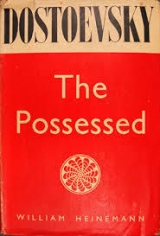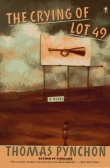
Текст книги "The Possessed"
Автор книги: Федор Достоевский
сообщить о нарушении
Текущая страница: 3 (всего у книги 49 страниц)
“I will never, never, abandon these bright hopes,” he used to say to me with shining eyes. Of these “bright hopes” he always spoke quietly, in a blissful half-whisper, as it were secretly. He was rather tall, but extremely thin and narrow-shouldered, and had extraordinarily lank hair of a reddish hue. All Stepan Trofimovitch's condescending gibes at some of his opinions he accepted mildly, answered him sometimes very seriously, and often nonplussed him. Stepan Trofimovitch treated him very kindly, and indeed he behaved like a father to all of us. “You are all half-hearted chickens,” he observed to Virginsky in joke. “All who are like you, though in you, Virginsky, I have not observed that narrow-mindedness I found in Petersburg, chez ces siminaristes.But you're a half-hatched chicken all the same. Shatov would give anything to hatch out,, but he's half-hatched too.”
“And I?” Liputin inquired.
” You're simply the golden mean which will get on anywhere in its own way.” Liputin was offended.
The story was told of Virginsky, and it was unhappily only too true, that before his wife had spent a year in lawful wedlock with him she announced that he was superseded and that she preferred Lebyadkin. This Lebyadkin, a stranger to the town, turned out afterwards to be a very dubious character, and not a retired captain as he represented himself to be. He could do nothing but twist his moustache, drink, and chatter the most inept nonsense that can possibly be imagined. This fellow, who was utterly lacking in delicacy, at once settled in his house, glad to live at another man's expense, ate and slept there and came, in the end, to treating the master of the house with condescension. It was asserted that when Virginsky's wife had announced to him that he was superseded he said to her:
“My dear, hitherto I have only loved you, but now I respect you,” but I doubt whether this renunciation, worthy of ancient Home, was ever really uttered. On the contrary they say that he wept violently. A fortnight after he was superseded, all of them, in a “family party,” went one day for a picnic to a wood outside the town to drink tea with their friends. Virginsky was in a feverishly lively mood and took part in the dances. But suddenly, without any preliminary quarrel, he seized the giant Lebyadkin with both hands, by the hair, just as the latter was dancing a can-cansolo, pushed him down, and began dragging him along with shrieks, shouts, and tears. The giant was so panic-stricken that he did not attempt to defend himself, and hardly uttered a sound all the time he was being dragged along. But afterwards he resented it with all the heat of an honourable man. Virginsky spent a whole night on his knees begging his wife's forgiveness. But this forgiveness was not granted, as he refused to apologise to Lebyadkin; moreover, he was upbraided for the meanness of his ideas and his foolishness, the latter charge based on the fact that he knelt down in the interview with his wife. The captain soon disappeared and did not reappear in our town till quite lately, when he came with his sister, and with entirely different aims; but of him later. It was no wonder that the poor young husband sought our society and found comfort in it. But he never spoke of his home-life to us. On one occasion only, returning with me from Stepan Trofimovitch's, he made a remote allusion to his position, but clutching my hand at once he cried ardently:
“It's of no consequence. It's only a personal incident. It's no hindrance to the 'cause,' not the slightest!”
Stray guests visited our circle too; a Jew, called Lyamshin, and a Captain Kartusov came. An old gentleman of inquiring mind used to come at one time, but he died. Liputin brought an exiled Polish priest called Slontsevsky, and for a time we received him on principle, but afterwards we didn't keep it up.
IX
At one time it was reported about the town that our little circle was a hotbed of nihilism, profligacy, and godlessness, and the rumour gained more and more strength. And yet we did nothing but indulge in the most harmless, agreeable, typically Russian, light-hearted liberal chatter. “The higher liberalism” and the “higher liberal,” that is, a liberal without any definite aim, is only possible in Russia.
Stepan Trofimovitch, like every witty man, needed a listener, and, besides that, he needed the consciousness that he was fulfilling the lofty duty of disseminating ideas. And finally he had to have some one to drink champagne with, and over the wine to exchange light-hearted views of a certain sort, about Russia and the “Russian spirit,” about God in general, and the “Russian God” in particular, to repeat for the hundredth time the same Russian scandalous stories that every one knew and everyone repeated. We had no distaste for the gossip of the town which often, indeed, led us to the most severe and loftily moral verdicts. We fell into generalising about humanity, made stern reflections on the future of Europe and mankind in general, authoritatively predicted that after Caesarism France would at once sink into the position of a second-rate power, and were firmly convinced that this might terribly easily and quickly come to pass. We had long ago predicted that the Pope would play the part of a simple archbishop in a united Italy, and were firmly convinced that this thousand-year-old question had, in our age of humanitarianism, industry, and railways, become a trifling matter. But, of course, “Russian higher liberalism” could not look at the question in any other way. Stepan Trofimovitch sometimes talked of art, and very well, though rather abstractly. He sometimes spoke of the friends of his youth – all names noteworthy in the history of Russian progress. He talked of them with emotion and reverence, though sometimes with envy. If we were very much bored, the Jew, Lyamshin (a little post-office clerk), a wonderful performer on the piano, sat down to play, and in the intervals would imitate a pig, a thunderstorm, a confinement with the first cry of the baby, and so on, and so on; it was only for this that he was invited, indeed. If we had drunk a great deal – and that did happen sometimes, though not often – we flew into raptures, and even on one occasion sang the “Marseillaise” in chorus to the accompaniment of Lyamshin, though I don't know how it went off. The great day, the nineteenth of February, we welcomed enthusiastically, and for a long time beforehand drank toasts in its honour. But that was long ago, before the advent of Shatov or Virginsky, when Stepan Trofimovitch was still living in the same house with Varvara Petrovna. For some time before the great day Stepan Trofimovitch fell into the habit of muttering to himself well-known, though rather far-fetched, lines which must have been written by some liberal landowner of the past:
“ The peasant with his axe is coming,
Something terrible will happen.”
Something of that sort, I don't remember the exact words. Varvara Petrovna overheard him on one occasion, and crying, “Nonsense, nonsense!” she went out of the room in a rage. Liputin, who happened to be present, observed malignantly to Stepan Trofimovitch:
“It'll be a pity if their former serfs really do some mischief to messieurs leslandowners to celebrate the occasion,” and he drew his forefinger round his throat.
“ Cher ami,” Stepan Trofimovitch observed, “believe me that -this (he repeated the gesture) will never be of any use to our landowners nor to any of us in general. We shall never be capable of organising anything even without our heads, though our heads hinder our understanding more than anything.”
I may observe that many people among us anticipated that something extraordinary, such as Liputin predicted, would take place on the day of the emancipation, and those who held this view were the so-called “authorities” on the peasantry and the government. I believe Stepan Trofimovitch shared this idea, so much so that almost on the eve of the great day he began asking Varvara Petrovna's leave to go abroad; in fact he began to be uneasy. But the great day passed, and some time passed after it, and the condescending smile reappeared on Stepan Trofimovitch's lips. In our presence he delivered himself of some noteworthy thoughts on the character of the Russian in general, and the Russian peasant in particular.
“Like hasty people we have been in too great a hurry with our peasants,” he said in conclusion of a series of remarkable utterances. “We have made them the fashion, and a whole section of writers have for several years treated them as though they were newly discovered curiosities. We have put laurel-wreaths on lousy heads. The Russian village has given us only 'Kamarinsky' in a thousand years. A remarkable Russian poet who was also something of a wit, seeing the great Rachel on the stage for the first time cried in ecstasy, 'I wouldn't exchange Rachel for a peasant! 'I am prepared to go further. I would'; give all the peasants in Russia for one Rachel. It's high time to look things in the face more soberly, and not to mix up our national rustic pitch with bouquet de I'lmpiratrice.”
Liputin agreed at once, but remarked that one had to perjure oneself and praise the peasant all the same for the sake of being progressive, that even ladies in good society shed tears reading “Poor Anton,” and that some of them even wrote from Paris to their bailiffs that they were, henceforward, to treat the peasants as humanely as possible.
It happened, and as ill-luck would have it just after the rumours of the Anton Petrov affair had reached us, that there was some disturbance in our province too, only about ten miles from Skvoreshniki, so that a detachment of soldiers was sent down in a hurry.
This time Stepan Trofimovitch was so much upset that he even frightened us. He cried out at the club that more troops were needed, that they ought to be telegraphed for from another province; he rushed off to the governor to protest that he had no hand in it, begged him not to allow his name on account of old associations to be brought into it, and offered to write about his protest to the proper quarter in Petersburg. Fortunately it all passed over quickly and ended in nothing, but I was surprised at Stepan Trofimovitch at the time.
Three years later, as every one knows, people were beginning to talk of nationalism, and “public opinion” first came upon the scene. Stepan Trofimovitch laughed a great deal.
“My friends,” he instructed us, “if our nationalism has 'dawned' as they keep repeating in the papers – it's still at school, at some German 'Peterschule,' sitting over a German book and repeating its everlasting German lesson, and its German teacher will make it go down on its knees when he thinks fit. I think highly of the German teacher. But nothing has happened and nothing of the kind has dawned and everything is going on in the old way, that is, as ordained by God. To my thinking that should be enough for Russia, pour notre Sainte Russie.Besides, all this Slavism and nationalism is too old to be new. Nationalism, if you like, has never existed among us except as a distraction for gentlemen's clubs, and Moscow ones at that. I'm not talking of the days of Igor, of course. And besides it all comes of idleness. Everything in Russia comes of idleness, everything good and fine even. It all springs from the charming, cultured, whimsical idleness of our gentry! I'm ready to repeat it for thirty thousand years. We don't know how to live by our own labour. And as for the fuss they're making now about the 'dawn' of some sort of public opinion, has it so suddenly dropped from heaven without any warning? How is it they don't understand that before we can have an opinion of our own we must have work, our own work, our own initiative in things, our own experience. Nothing is to be gained for nothing. If we work we shall have an opinion of our own. But as we never shall work, our opinions will be formed for us by those who have hitherto done the work instead of us, that is, as always, Europe, the everlasting Germans – our teachers for the last two centuries. Moreover, Russia is too big a tangle for us to unravel alone without the Germans, and without hard work. For the last twenty years I've been sounding the alarm, and the summons to work. I've given up my life to that appeal, and, in my folly I put faith in it. Now I have lost faith in it, but I sound the alarm still, and shall sound it to the' tomb. I will pull at the bell-ropes until they toll for my own requiem!”
“Alas! We could do nothing but assent. We applauded our teacher and with what warmth, indeed! And, after all, my friends, don't we still hear to-day, every hour, at every step, the game “charming,” “clever,” “liberal,” old Russian nonsense? Our teacher believed in God.
“I can't understand why they make me out an infidel here,” he used to say sometimes. “I believe in God, mais distinguons,I believe in Him as a Being who is conscious of Himself in me only. I cannot believe as my Nastasya (the servant) or like some country gentleman who believes 'to be on the safe side,' or like our dear Shatov – but no, Shatov doesn't come into it. Shitov believes 'on principle,' like a Moscow Slavophil. as for Christianity, for all my genuine respect for it, I'm not a Christian. I am more of an antique pagan, like the great Goethe, or like an ancient Greek. The very fact that Christianity has failed to understand woman is enough, as George Sand has so splendidly shown in one of her great 'novels. As for the bowings, fasting and all the rest of it, I don't understand what they have to do with me. However busy the informers may be here, I don't care to become a Jesuit. In the year 1847 Byelinsky, who was abroad, sent his famous letter to Gogol, and warmly reproached him for believing in some sort of God. Entre nous soit dit, Ican imagine nothing more comic than the moment when Gogol (the Gogol of that period!) read that phrase, and . . . the whole letter! But dismissing the humorous aspect, and, as I am fundamentally in agreement, I point to them and say – these were men! They knew how to love their people, they knew how to suffer for them, they knew how to sacrifice everything for them, yet they knew how to differ from them when they ought, and did not filch certain ideas from them. Could Byelinsky have sought salvation in Lenten oil, or peas with radish! . . .” But at this point Shatov interposed.
“Those men of yours never loved the people, they didn't suffer for them, and didn't sacrifice anything for them, though they may have amused themselves by imagining it!” he growled sullenly, looking down, and moving impatiently in his chair.
“They didn't love the people!” yelled Stepan Trofimovitch. “Oh, how they loved Russia!”
“Neither Russia nor the people!” Shatov yelled too. with flashing eyes. “You can't love what you don't know and they had no conception of the Russian people. All of them peered at the Russian people through their fingers, and you do too; Byelinsky especially: from that very letter to Gogol one can see it. Byelinsky, like the Inquisitive Man in Krylov's fable, did not notice the elephant in the museum of curiosities, but concentrated his whole attention on the French Socialist beetles; he did not get beyond them. And yet perhaps he was cleverer than any of you. You've not only overlooked the people, you've taken up an attitude of disgusting contempt for them, if only because you could not imagine any but the French people, the Parisians indeed, and were ashamed that the Russians were not like them. That's the naked truth. And he who has no people has no God. You may be sure that all who cease to understand their own people and lose their connection with them at once lose to the same extent the faith of their fathers, and become atheistic or indifferent. I'm speaking the truth! This is a fact which will be realised. That's why all of you and all of us now are either beastly atheists or careless, dissolute imbeciles, and nothing more. And you too, Stepan Trofimovitch, I don't make an exception of you at all! In fact, it is on your account I am speaking, let me tell you that!”
As a rule, after uttering such monologues (which happened to him pretty frequently) Shatov snatched up his cap and rushed to the door, in the full conviction that everything was now over, and that he had cut short all friendly relations with Stepan Trofimovitch for ever. But the latter always succeeded in stopping him in time.
“Hadn't we better make it up, Shatov, after all these endearments,” he would say, benignly holding out his hand to him from his arm-chair.
Shatov, clumsy and bashful, disliked sentimentality. Externally he was rough, but inwardly, I believe, he had great delicacy. Although he often went too far, he was the first to suffer for it. Muttering something between his teeth in response to Stepan Trofimovitch's appeal, and shuffling with his feet like a bear, he gave a sudden and unexpected smile, put down his cap, and sat down in the same chair as before, with his eyes stubbornly fixed on the ground. Wine was, of course, brought in, and Stepan Trofimovitch proposed some suitable toast, for instance the memory of some leading man of the past.
Last updated on Wed Jan 12 09:26:22 2011 for eBooks@Adelaide.
The Possessed, by Fyodor Dostoyevsky
Chapter II. Prince Harry. Matchmaking.
THERE WAS ANOTHER being in the world to whom Varvara Petrovna was as much attached as she was to Stepan Trofimovitch, her only son, Nikolay Vsyevolodovitch Stavrogin. It was to undertake his education that Stepan Trofimovitch had been engaged. The boy was at that time eight years old, and his frivolous father, General Stavrogin, was already living apart from Varvara Petrovna, so that the child grew up entirely in his mother's care. To do Stepan Trofimovitch justice, he knew how to win his pupil's heart. The whole secret of this lay in the fact that he was a child himself. I was not there in those days, and he continually felt the want of a real friend. He did not hesitate to make a friend of this little creature as soon as he had grown a little older. It somehow came to pass quite naturally that there seemed to be no discrepancy of age between them. More than once he awaked his ten– or eleven-year-old friend at night, simply to pour out his wounded feelings and weep before him, or to tell him some family secret, without realising that this was an outrageous proceeding. They threw themselves into each other's arms and wept. The boy knew that his mother loved him very much, but I doubt whether he cared much for her. She talked little to him and did not often interfere with him, but he was always morbidly conscious of her intent, searching eyes fixed upon him. Yet the mother confided his whole instruction and moral education to Stepan Trofimovitch. At that time her faith in him was unshaken. One can't help believing that the tutor had rather a bad influence on his pupil's nerves. When at sixteen he was taken to a lyceum he was fragile-looking and pale, strangely quiet and dreamy. (Later on he was distinguished by great physical strength.) One must assume too that the friends went on weeping at night, throwing themselves in each other's arms, though their tears were not always due to domestic difficulties. Stepan Trofimovitch succeeded in reaching the deepest chords in his pupil's heart, and had aroused in him a vague sensation of that eternal, sacred yearning which some elect souls can never give up for cheap gratification when once they have tasted and known it. (There are some connoisseurs who prize this yearning more than the most complete satisfaction of it, if such were possible.) But in any case it was just as well that the pupil and the preceptor were, though none too soon, parted.
For the first two years the lad used to come home from the lyceum for the holidays. While Varvara Petrovna and Stepan Trofimovitch were staying in Petersburg he was sometimes present at the literary evenings at his mother's, he listened and looked on. He spoke little, and was quiet and shy as before. His manner to Stepan Trofimovitch was as affectionately attentive as ever, but there was a shade of reserve in it. He unmistakably avoided distressing, lofty subjects or reminiscences of the past. By his mother's wish he entered the army on completing the school course, and soon received a commission in one of the most brilliant regiments of the Horse Guards. He did not come to show himself to his mother in his uniform, and his letters from Petersburg began to be infrequent. Varvara Petrovna sent him money without stint, though after the emancipation the revenue from her estate was so diminished that at first her income was less than half what it had been before. She had, however, a considerable sum laid by through years of economy. She took great interest in her son's success in the highest Petersburg society. Where she had failed, the wealthy young officer with expectations succeeded. He renewed acquaintances which she had hardly dared to dream of, and was welcomed everywhere with pleasure. But very soon rather strange rumours reached Varvara Petrovna. The young man had suddenly taken to riotous living with a sort of frenzy. Not that he gambled or drank too much; there was only talk of savage recklessness, of running over people in the street with his horses, of brutal conduct to a lady of good society with whom he had a liaison and whom he afterwards publicly insulted. There was a callous nastiness about this affair. It was added, too, that he had developed into a regular bully, insulting people for the mere pleasure of insulting them. Varvara Petrovna was greatly agitated and distressed. Stepan Trofimovitch assured her that this was only the first riotous effervescence of a too richly endowed nature, that the storm would subside and that this was only like the youth of Prince Harry, who caroused with Falstaff, Poins, and Mrs. Quickly, as described by Shakespeare.
This time Varvara Petrovna did not cry out, “Nonsense, nonense!” as she was very apt to do in later years in response to Stepan Trofimovitch. On the contrary she listened very eagerly, asked him to explain this theory more exactly, took up Shakespeare herself and with great attention read the immortal chronicle. But it did not comfort her, and indeed she did not find the resemblance very striking. With feverish impatience she awaited answers to some of her letters. She had not long to wait for them. The fatal news soon reached her that “Prince Harry” had been involved in two duels almost at once, was entirely to blame for both of them, had killed one of his adversaries on the spot and had maimed the other and was awaiting his trial in consequence. The case ended in his being degraded to the ranks, deprived of the rights of a nobleman, and transferred to an infantry line regiment, and he only escaped worse punishment by special favour.
In 1863 he somehow succeeded in distinguishing himself; he received a cross, was promoted to be a non-commissioned officer, and rose rapidly to the rank of an officer. During this period Varvara Petrovna despatched perhaps hundreds of letters to the capital, full of prayers and supplications. She even stooped to some humiliation in this extremity. After his promotion the young man suddenly resigned his commission, but he did not come back to Skvoreshniki again, and gave up writing to his mother altogether. They learned by roundabout means that he was back in Petersburg, but that he was not to be met in the same society as before; he seemed to be in hiding. They found out that he was living in strange company, associating with the dregs of the population of Petersburg, with slip-shod government clerks, discharged military men, beggars of the higher class, and drunkards of all sorts – that he visited their filthy families, spent days and nights in dark slums and all sorts of low haunts, that he had sunk very low, that he was in rags, and that apparently he liked it. He did not ask his mother for money, he had his own little estate – once the property of his father, General Stavrogin, which yielded at least some revenue, and which, it was reported, he had let to a German from Saxony. At last his mother besought him to come to her, and “Prince Harry” made his appearance in our town. I had never feet eyes him before, but now I got a very distinct impression of him. He was a very handsome young man of five-and-twenty, and I must own I was impressed by him. I had expected to see a dirty ragamuffin, sodden with drink and debauchery. He was on the contrary, the most elegant gentleman I had ever met' extremely well dressed, with an air and manner only to be found in a man accustomed to culture and refinement. I was not the only person surprised. It was a surprise to all the townspeople to whom, of course, young Stavrogin's whole biography was well known in its minutest details, though one could not imagine how they had got hold of them, and, what was still more surprising, half of their stories about him turned out to be true.
All our ladies were wild over the new visitor. They were sharply divided into two parties, one of which adored him while the other half regarded him with a hatred that was almost blood-thirsty: but both were crazy about him. Some of them were particularly fascinated by the idea that he had perhaps a fateful secret hidden in his soul; others were positively delighted at the fact that he was a murderer. It appeared too that he had had a very good education and was indeed a man of considerable culture. No great acquirements were needed, of course, to astonish us. But he could judge also of very interesting everyday affairs, and, what was of the utmost value, he judged of them with remarkable good sense. I must mention as a peculiar fact that almost from the first day we all of us thought him a very sensible fellow. He was not very talkative, he was elegant without exaggeration, surprisingly modest, and at the same time bold and self-reliant, as none of us were. Our dandies gazed at him with envy, and were completely eclipsed by him. His face, too, impressed me. His hair was of a peculiarly intense black, his light-coloured eyes were peculiarly light and calm, his complexion was peculiarly soft and white, the red in his cheeks was too bright and clear, his teeth were like pearls, and his lips like coral – one would have thought that he must be a paragon of beauty, yet at the same time there seemed something repellent about him. It was said that his face suggested a mask; so much was said though, among other things they talked of his extraordinary physical strength. He was rather tall. Varvara Petrovna looked at him with pride, yet with continual uneasiness. He spent about six months among us – listless, quiet, rather morose. He made his appearance in society, and with unfailing propriety performed all the duties demanded by our provincial etiquette. He was related, on his father's side, to the governor, and was received by the latter as a near kinsman. But a few months passed and the wild beast showed his claws.
I may observe by the way, in parenthesis, that Ivan Ossipovitch, our dear mild governor, was rather like an old woman, though he was of good family and highly connected – which explains the fact that he remained so long among us, though he steadily avoided all the duties of his office. From his munificence and hospitality he ought rather to have been a marshal of nobility of the good old days than a governor in such busy times as ours. It was always said in the town that it was not he, but Varvara Petrovna who governed the province. Of course this was said sarcastically; however, it was certainly a falsehood. And, indeed, much wit was wasted on the subject among us. On the contrary, in later years, Varvara Petrovna purposely and consciously withdrew from anything like a position of authority, and, in spite of the extraordinary respect in which she was held by the whole province, voluntarily confined her influence within strict limits set up by herself. Instead of these higher responsibilities she suddenly took up the management of her estate, and, within two or three years, raised the revenue from it almost to what it had yielded in the past. Giving up her former romantic impulses (trips to Petersburg, plans for founding a magazine, and so on) she began to be careful and to save money. She kept even Stepan Trofimovitch at a distance, allowing him to take lodgings in another house (a change for which he had long been worrying her under various pretexts). Little by little Stepan Trofimovitch began to call her a prosaic woman, or more jestingly, “My prosaic friend.” I need hardly say he only ventured on such jests in an extremely respectful form, and on rare, and carefully chosen, occasions.
All of us in her intimate circle felt – Stepan Trofimovitch more acutely than any of us – that her son had come to her almost, as it were, as a new hope, and even as a sort of new aspiration. Her passion for her son dated from the time of his successes in Petersburg society, and grew more intense from the moment that he was degraded in the army. Yet she was evidently afraid of him, and seemed like a slave in his presence. It could be seen that she was afraid of something vague and mysterious which she could not have put into words, and she often stole searching glances at “Nicolas,” scrutinising him reflectively . . . and behold – the wild beast suddenly showed his claws.
II
Suddenly, apropos of nothing, our prince was guilty of incredible outrages upon various persons and, what was most striking these outrages were utterly unheard of, quite inconceivable, unlike anything commonly done, utterly silly and mischievous, quite unprovoked and objectless. One of the most respected of our club members, on our committee of management, Pyotr Pavlovitch Gaganov, an elderly man of high rank in the service, had formed the innocent habit of declaring vehemently on all sorts of occasions: “No, you can't lead me by the nose!” Well, there is no harm in that. But one day at the club, when he brought out this phrase in connection with some heated discussion in the midst of a little group of members (all persons of some consequence) Nikolay Vsyevolodovitch, who was standing on one side, alone and unnoticed, suddenly went up to Pyotr Pavlovitch, took him unexpectedly and firmly with two fingers by the nose, and succeeded in leading him two or three steps across the room. He could have had no grudge against Mr. Gaganov. It might be thought to be a mere schoolboy prank, though, of course, a most unpardonable one. Yet, describing it afterwards, people said that he looked almost dreamy at the very instant of the operation, “as though he had gone out of his mind,” but that was recalled and reflected upon long afterwards. In the excitement of the moment all they recalled was the minute after, when he certainly saw it all as it really was, and far from being confused smiled gaily and maliciously “without the slightest regret.” There was a terrific outcry; he was surrounded. Nikolay Vsyevolodovitch kept turning round, looking about him, answering nobody, and glancing curiously at the persons exclaiming around him. At last he seemed suddenly, as it were, to sink into thought again – so at least it was reported – frowned, went firmly up to the affronted Pyotr Pavlovitch, and with evident vexation said in a rapid mutter:








